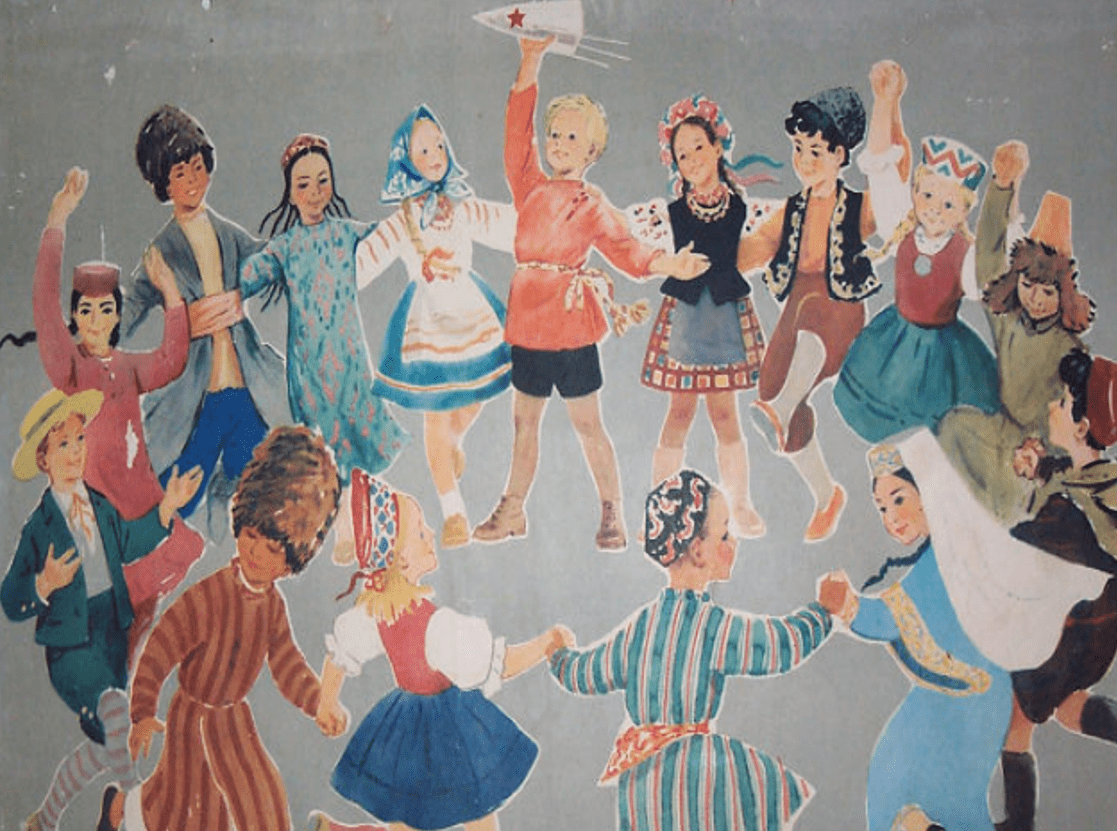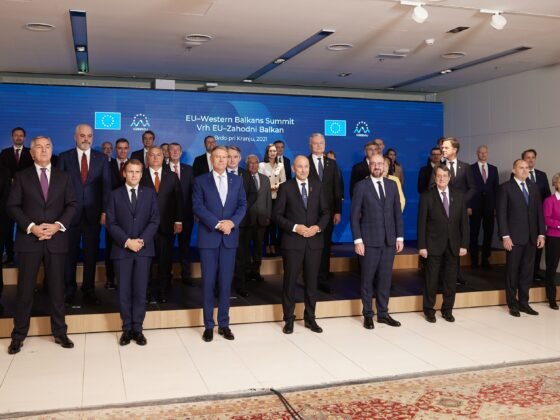President Vladimir Putin has successfully mobilized a sense of militant patriotism in the Russian public to wage war in Ukraine. The Kremlin’s propaganda builds on seeing Russia as both victimized by the West and entitled to regional dominance in the former Soviet territories. In such Russian imperial imagination, enforcing the Russian language, culture, and rule on non-Russian populations is not colonialism but a gift of greatness. Critics among intellectual and liberal elites in Russia condemn the regime but tend to shy away from questioning Russia’s imperial identity. To solve Russia’s antagonistic relations with its neighbors, both the Russian state and society need to confront their country’s imperial identity.
The Public Largely Buys Putin’s Worldview
Even after the massacre in Bucha and the destruction of Mariupol, many in Russia continue to support the war in Ukraine. Polls find that most Russians accept Putin’s rhetoric of “denazification” and “demilitarization” of Ukraine, despite facing economic uncertainty, lost savings, and food shortages due to Western sanctions. Putin has banned independent media, cut access to social media, and criminalized opposition to the government to propel the Kremlin’s view unobstructed by critical voices. Russian TV channels broadcast the same Kremlin disinformation about the war, praising the Russian military and vilifying Ukrainian resistance.
Yet it is wrong to assume Russian citizens support the war only because of the Kremlin’s tough media control. When the Russian government banned Western social media sites, most users in Russia continued to access Facebook, Instagram, and Twitter. In the past, powerful voices have uncovered and spoken out about corruption and political manipulation in the Putin regime. But in the case of the war, many choose not to listen to alternative perspectives. Instead, they submit to Putin’s worldview—even the Russian liberal opposition that criticizes the regime avoids questioning the Russian identity as an empire. What is it about the Kremlin’s national ideology that convinces millions to support a belligerent Russia?
The Victim and Victimizer
Putin’s propaganda builds on seeing Russia as both victimized by the West and entitled to regional dominance over Ukraine, Belarus, Central Asia, and the South Caucasus. Russia’s sense of its lost greatness in 1991 after the demise of the Soviet Union fuels a sense that it is the innocent victim of outside powers. Its shrunken geography and collapsing economy made post-Soviet Russia economically poor compared to the wealth accumulated by Western colonial metropoles. Soviet socialism as a global anti-capitalist force had failed to bring the same level of prosperity. Russian intellectuals became preoccupied with their own imagined marginal position vis-à-vis the West fueling the denial of the true colonial nature of the Soviet regime.
At the same time, Russian political elites expect loyalty from former Russian colonies that includes knowledge of the Russian language and political loyalty, and unity in opposition to Western influence. According to such an imperial view, Russian rule over non-Russian populations is not colonialism but a gift of modernity. It is a deeply altruistic act for the sake of backward people. Rejection of Russian cultural dominance, including building independent foreign policy and contesting the Russian view of Soviet history, is an act of political disloyalty. In Central Asia, for instance, Russian ambassadors routinely condemn states’ prioritization of indigenous languages as attempts to limit the rights of the ethnic Russian population. Such search for independence triggers a sense of victimhood in Russia, as if disagreement with the Russian imperial self-image is an attack on Russian cultural greatness.
Putin coupled Russia’s innocent victim narrative with a historical self-image of a civilizing power against former Soviet republics that sought closer ties with the West. The Russian imperial myth allows identity mobilization around militant patriotism while also helping the state keep the public passive and uncritical. Putin recently spoke about Russia’s imperial identity when announcing the military attack on Ukraine: “It was necessary to immediately stop this nightmare—the genocide against the millions of people living there, who rely only on Russia, hope only on us.” Western leaders’ naming atrocities in Bucha a genocide further deepened the Russian regime’s sense of victimhood. The Russian Defense Ministry stated that the West is collectively attacking Russia. Feeling humiliated by the West, the Russian public was simultaneously supporting Russian aggression in former Soviet territories. Economic hardships can be reframed as a burden unjustly borne by a victim-savior or as an imperial duty of those who humanely seek to liberate the world from evil.
Putin’s View of History
Longing for Soviet-scale influence, Putin has praised Stalin, revived the Soviet national anthem as the Russian one, and recently banned a review of Soviet atrocities, including a project by the Memorial human rights organization. He renewed the Stalinist mythology of a “great Russian people” destined to “balance” against Western imperialism on the world stage. He questioned the rightful independence of Ukraine, Kazakhstan, and Georgia. Likewise, Russian political elites have highlighted the “progressive” sides of the Soviet regime and Russia’s role as a supreme power, especially during World War II.
Russia’s dual self-perception as a victim of the West and an entitled defender of former Soviet territories was rarely critically discussed in Russia or internationally. In Russia, reviews critical of Russian Soviet history came out for roughly a decade, starting during perestroika and ending with Putin’s ascent to power. Granted, the 1990s were plagued with economic uncertainty, reducing the space for political debates on Russia’s imperial identity. Most Russian academics still shy away from classifying the Soviet regime as a colonial project. Russian academia perpetuates the notion that Bolsheviks brought modernity to non-Russian Soviet people. For its part, the liberal Russian intelligentsia avoids confronting Russia’s acceptance of its brutal colonial history by blaming the “barbaric Asiatic legacy” for contemporary authoritarianism. In short, a racist view of their own political reality prevents Russian elites from facing the truth of Russia’s colonial and illiberal past.
Writers such as Aleksandr Solzhenitsyn and Joseph Brodsky were not sufficient in reassessing the Soviet past. As a leading cultural figure criticizing Stalinism, Solzhenitsyn was also a prominent imperial nationalist who called for the annexation of northern Kazakhstan and denied Ukraine’s cultural autonomy. Likewise, Brodsky, the intelligentsia’s spiritual idol, refused to recognize Ukraine as a sovereign nation.
Global scholarship and political elites, too, have largely failed to see Russia from a decolonial perspective. Most Western academic literature still views Central Asian countries as benefitting from the Soviet presence, including redrawing the region into national republics, imposing Soviet schooling, and building the region’s physical infrastructure. In the meantime, scholarship from Central Asia often has difficulties being heard in the West because of power hierarchies in knowledge production. Since the Soviet collapse, policymakers in the West saw Russia as cementing sovereign rights of ex-colonies, especially in Central Asia. The West accepted Russia as the regional leader in Eurasia and negotiated for Ukraine and Kazakhstan to transfer nuclear missiles to Russia.
Activists in the Global South, too, still see the Soviet Union as an anti-Western, anti-capitalist power. Many associate it with Marxism and communism and as an alternative to capitalism. The countries of the Global South make up the bulk of the opposition in the UN General Assembly against condemning Russia’s actions in Ukraine. Such views ignore the fate of non-Russian nationalities who suffered mass starvation, purges, and genocide. Recently, Black intellectuals in the United States have begun comparing the Soviet Union to a variant of settler colonialism with the Russians as the settler nation. A critical review of the Russian colonial experience is necessary in the Global South as well.
The Rise of Decolonial Thinking
The Russian state carefully polices how history is written and taught in the states formerly under Soviet rule, especially in the Central Asian republics. Russian embassies regularly intervene in school curricula, insisting on a positive portrayal of Russia’s role in the region. In Kyrgyzstan, the Russian embassy planned to screen propaganda films on the “real events” in Donbas. Following opposition from local NGOs, the plan was abandoned. Russian diplomats also pressure countries to support Russian security initiatives in the region. Shortly before the invasion of Ukraine, the Russian ambassador in Nur-Sultan insisted that Kazakhstan would need to cut military ties with the United States and firmly align with Russia.
Nations formerly under Soviet occupation increasingly oppose Putin’s longing for Soviet order. From Ukraine to Georgia and Kyrgyzstan, decolonial discourse is rapidly expanding into the mainstream. In Ukraine and Kazakhstan, the horrors of mass starvations that killed millions reveal the unimaginable human cost of the Soviet regime. Academics in Georgia and Kyrgyzstan are reexamining the purges of elites, increasingly calling both Tsarist and Soviet Russia imperial powers. The war in Ukraine accelerated decolonial discourse. The renewed interest in the past has revealed the unpleasant hierarchies of the Soviet regime and eroded the Soviet construct of Russia as an altruistic nation, sacrificing itself for the sake of non-Russian republics. Instead of seeing the Soviet regime as a gift of modernity, more people are inclined to see Soviet Russia as a brutal colonizer.
The deeper the awareness of Soviet devastation, the stronger the grassroots resist a resurrection of a Russian-led empire in former Soviet territories. An appreciation for freedom from ideological totalitarianism and Russian dominance has already taken root in these countries. Mass pro-Ukraine rallies in Tbilisi, Almaty, and Bishkek point to how a reexamined understanding of the Russian imperial and Soviet past further undermines Putin’s untenable geopolitical goals.
Undoing Imperialism
The Russian invasion of Ukraine could start the painful process of decolonizing Russia. Much depends on whether Russian intellectuals let go of the ideals of a great Russian people and the friendship of “brotherly” nations. This requires accepting the sovereignty and equality of other countries and cultures and admitting responsibility for the Soviet genocidal colonial past. Decolonizing Russian political discourse and culture will debunk the myth of Russian imperial innocence and victimhood and restore the dignity of the colonized.
Today, Russia’s political elites and intellectuals face two monumental tasks. First, Russian studies must be unwoven from understanding Russian imperial ambitions. This includes listening to non-Russian scholars from countries formerly under Soviet control and from within Russia instead of speaking for them or about them. It is necessary to allow the victims of Russian and Soviet colonialism—from Chechens and Buryats to Ukrainians and Kazakhs—to participate in amending the Russian past. An honest confrontation of the past would allow for the realization that places like Chechnya, in its current structure, are a product of modern Russian colonialism and that Ramzan Kadyrov is not a Chechen leader but a Russian colonial officer.
Second, it is not enough just to condemn the totalitarian legacies of the Tsarist, Soviet, and Putin regimes. The Russian state must also accept responsibility and repentance for historical atrocities in Russia and neighboring countries. Truth and reconciliation committees focusing on both Soviet Russian and contemporary atrocities can be the necessary pathway to engage sides in an equal dialogue. The experience of post-apartheid South Africa in uncovering human rights violations can be a model for Russia as well.
Decolonizing Russia and challenging its imperial innocence will not be easy regardless of how the war in Ukraine ends. But as much as decolonizing Russia is important for the territories it formerly occupied, reprocessing its history is also key for the survival of Russia within its current boundaries. By seeing its colonial subjects on its territory as equals and reforming to avoid future mass atrocities at all costs, Russia can finally become a strong federative system built on the shared values of political representation, pluralism, and inclusion.
Botakoz Kassymbekova is Lecturer at the University of Basel in Switzerland. (Twitter: @BotakozKassymb1)
Erica Marat is Associate Professor at the National Defense University’s College of International Affairs. (Twitter: @EricaMarat)
The opinions presented here are their own and do not reflect the views of National Defense University, the U.S. Defense Department, or any other agency of the U.S. government.
PONARS Eurasia Policy Memo No. 771











